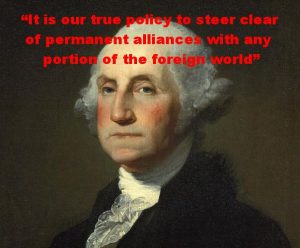 One of the common themes I see in politics is frustration with our representatives in Washington. They are perceived to be partially if not fully responsible for the woes of our nation. Personally, I don’t find fault with them. I blame me and and I blame you.
One of the common themes I see in politics is frustration with our representatives in Washington. They are perceived to be partially if not fully responsible for the woes of our nation. Personally, I don’t find fault with them. I blame me and and I blame you.
In the United States we live in what is called a Representative Republic. This basically means that the voters elect representatives who make the decisions. Now, we are slowly becoming a democracy but I’ll save my opinion on that development for a future post.
One argument here is that if we don’t like what our representatives are doing in Washington, in our State, or in our home town, then we have a simple remedy. Vote for someone who makes better decisions.
However, this is not my main argument. In a representative Republic the politicians are representative of the voters. So, if we don’t like the politicians then our problem is with ourselves. What has happened to the United States? Or has anything happened? Have we always be selfish, bickering, and out to gratify our immediate needs regardless of future consequences?
I think the evidence suggests that there was a time when Americans cared about something besides themselves. Certainly the Founding Fathers were trying to build a nation that would change the world, not just their circumstances with England.
I realize there are many wonderful people in this country but the we must look to our politicians because they are a reflection of who we are. Our votes, our values, our desires. That’s what we see in Washington, us. I see men and women who desire election more than governance, whose decisions are based on what will grant them immediate gratification (election victory, donor money) and no stomach for painful solutions. Why do I see this? Because this is us. We vote for them, we, apparently, want them.
Don’t get me wrong here. I’m still an Objectivist of the Ayn Rand school. People need to do what is in their self-interest. But, it is in our self-interest to have a strong country.
Your next question is, and should be, so Tom, complain away but what do you offer as a solution? Stop telling me what’s wrong and start telling me how to fix it.
Here it is. Teach people to think critically.
Write blogs on how to make good decisions. Think everything through so as to be a shining example for your friends and your family. Listen to the political pundits and then research their words. Read articles, come to an informed, critical decision. If the majority of people can do this, and it’s not easy, then we will elect politicians who do the same thing. Then, well, anything is possible.
Tom Liberman
Sword and Sorcery fantasy with a Libertarian Twist


